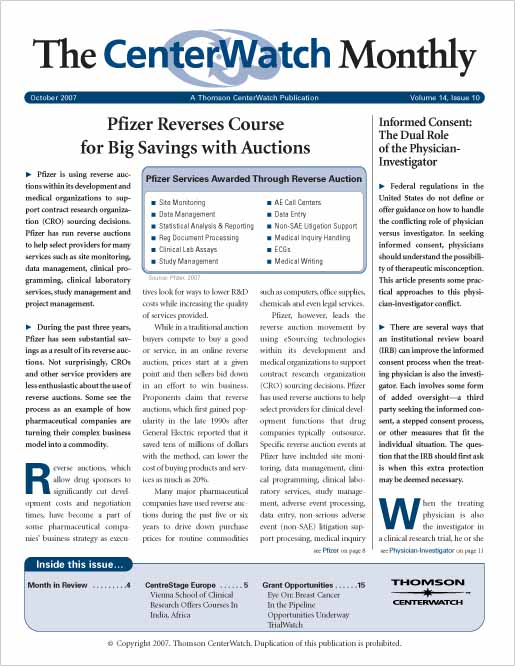October 2007 – The CenterWatch Monthly : PDF
Product Details
Pfizer Reverses Course for Big Savings with Auctions
Pfizer is using reverse auctions within its development and medical organizations to support contract research organization (CRO) sourcing decisions. Pfizer has run reverse auctions to help select providers for many services such as site monitoring, data management, clinical programming, clinical laboratory services, study management and project management.During the past three years, Pfizer has seen substantial savings as a result of its reverse auctions. Not surprisingly, CROs and other service providers are less enthusiastic about the use of reverse auctions. Some see the process as an example of how pharmaceutical companies are turning their complex business model into a commodity.
Informed Consent: The Dual Role of the Physician-Investigator
Federal regulations in the United States do not define or offer guidance on how to handle the conflicting role of physician versus investigator. In seeking informed consent, physicians should understand the possibility of therapeutic misconception. This article presents some practical approaches to this physician-investigator conflict.There are several ways that an institutional review board (IRB) can improve the informed consent process when the treating physician is also the investigator. Each involves some form of added oversight a third party seeking the informed consent, a stepped consent process, or other measures that fit the individual situation. The question that the IRB should first ask is when this extra protection may be deemed necessary.
Vienna School of Clinical Research Offers Courses in India, Africa
The Vienna School of Clinical Research (VSCR) recently gave its first workshop in New Delhi, India, a new milestone for the school. The school is also working on multiple projects in sub-Saharan African countries, and most recently offered training to future members of the Gabonese National Ethics Committee.
Eye On: Breast Cancer
In the United States in 2005, 212,000 new cases of invasive breast cancer were diagnosed, and there were approximately 40,870 deaths, making breast cancer the second leading cause of cancer death. Despite earlier diagnosis through mammographic screening, about 20%-89% of those diagnosed with early breast cancer develop metastases within five year.
Also in this issue:
- Month in Review
- TrialWatch
- Opportunities Initiating
